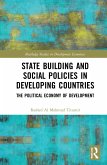Tirivavi Moyo, Gerrit Crafford, Fidelis Emuze
Unpacking the Decent Work Agenda in Construction Operations for Developing Countries
Tirivavi Moyo, Gerrit Crafford, Fidelis Emuze
Unpacking the Decent Work Agenda in Construction Operations for Developing Countries
- Gebundenes Buch
- Merkliste
- Auf die Merkliste
- Bewerten Bewerten
- Teilen
- Produkt teilen
- Produkterinnerung
- Produkterinnerung
This book proposes ways of improving and sustaining construction labour productivity through fulfilling the decent work agenda.
Andere Kunden interessierten sich auch für
![Tourism Enterprises and the Sustainability Agenda across Europe Tourism Enterprises and the Sustainability Agenda across Europe]() Tourism Enterprises and the Sustainability Agenda across Europe220,99 €
Tourism Enterprises and the Sustainability Agenda across Europe220,99 €![Enhancing Capabilities through Labour Law Enhancing Capabilities through Labour Law]() Supriya RouthEnhancing Capabilities through Labour Law59,99 €
Supriya RouthEnhancing Capabilities through Labour Law59,99 €![The Research Impact Agenda The Research Impact Agenda]() Martyna ¿LiwaThe Research Impact Agenda74,99 €
Martyna ¿LiwaThe Research Impact Agenda74,99 €![Socioeconomic Shocks and Africa's Development Agenda Socioeconomic Shocks and Africa's Development Agenda]() Socioeconomic Shocks and Africa's Development Agenda64,99 €
Socioeconomic Shocks and Africa's Development Agenda64,99 €![Energy Efficiency in Developing Countries Energy Efficiency in Developing Countries]() Energy Efficiency in Developing Countries63,99 €
Energy Efficiency in Developing Countries63,99 €![Decision Support for Construction Cost Control in Developing Countries Decision Support for Construction Cost Control in Developing Countries]() Chrispin PettangDecision Support for Construction Cost Control in Developing Countries171,99 €
Chrispin PettangDecision Support for Construction Cost Control in Developing Countries171,99 €![State Building and Social Policies in Developing Countries State Building and Social Policies in Developing Countries]() Rashed Al Mahmud TitumirState Building and Social Policies in Developing Countries199,99 €
Rashed Al Mahmud TitumirState Building and Social Policies in Developing Countries199,99 €-
-
-
This book proposes ways of improving and sustaining construction labour productivity through fulfilling the decent work agenda.
Hinweis: Dieser Artikel kann nur an eine deutsche Lieferadresse ausgeliefert werden.
Hinweis: Dieser Artikel kann nur an eine deutsche Lieferadresse ausgeliefert werden.
Produktdetails
- Produktdetails
- Verlag: Routledge
- Seitenzahl: 134
- Erscheinungstermin: 7. Juni 2023
- Englisch
- Abmessung: 240mm x 161mm x 12mm
- Gewicht: 373g
- ISBN-13: 9781032427904
- ISBN-10: 1032427906
- Artikelnr.: 67517068
- Herstellerkennzeichnung
- Libri GmbH
- Europaallee 1
- 36244 Bad Hersfeld
- gpsr@libri.de
- Verlag: Routledge
- Seitenzahl: 134
- Erscheinungstermin: 7. Juni 2023
- Englisch
- Abmessung: 240mm x 161mm x 12mm
- Gewicht: 373g
- ISBN-13: 9781032427904
- ISBN-10: 1032427906
- Artikelnr.: 67517068
- Herstellerkennzeichnung
- Libri GmbH
- Europaallee 1
- 36244 Bad Hersfeld
- gpsr@libri.de
Tirivavi Moyo, PhD, is a Senior Lecturer in the Department of Quantity Surveying at the Nelson Mandela University, Gqeberha, South Africa. He is an upcoming researcher with several publications on construction economics issues and holds a PhD in Construction Economics. He has a passion for decent work, sustainable construction and productivity. Gerrit Crafford, PhD, is a Professor in the Department of Quantity Surveying at the Nelson Mandela University, South Africa. He is a results-driven, independent, determined and resourceful construction economics academic. Dr Crafford has an established domestic research track record and enjoys international recognition for his research outputs' quality and impact. He has research interests in higher education teaching and learning and business strategy. Dr Crafford envisions driving strategic innovation in an international institution or organisation in his ideal future. Fidelis Emuze, PhD, is a Professor and Head of the Department of Built Environment at the Central University of Technology, Free State (CUT), South Africa. Lean construction, health, safety, wellbeing, and sustainability constitute the primary research interest of Dr Emuze, a National Research Foundation-rated researcher who has published over 270 research outputs and received over 25 awards and recognitions. Dr Emuze is the editor of Value and Waste in Lean Construction and Valuing People in Construction, and co-editor of Construction Health and Safety in Developing Countries. Dr Emuze authored Construction Safety Pocketbook for South Africa in 2020. Dr Emuze is the International Coordinator of CIB W123 - People in Construction Working Commission.
LIST OF TABLES
PREFACE
ACKNOWLEDGEMENTS
ABOUT THE AUTHORS
CHAPTER 1 - BACKGROUNDCHAPTER
CHAPTER 2- DECENT WORK OBJECTIVES FOR MONITORING CONSTRUCTION LABOUR
PERFORMANCE
CHAPTER 3 - DECENT WORK CONDITIONS FOR IMPROVING CONSTRUCTION LABOUR
PRODUCTIVITY IN ZIMBABWE
CHAPTER 4 - CORPORATE SOCIAL RESPONSIBILITY FOR ENHANCED SKILLED
CONSTRUCTION WORKERS' SOCIAL SECURITY
CHAPTER 5 - PEOPLE-CENTRED MANAGEMENT FOR IMPROVED CONSTRUCTION WORKERS'
PRODUCTIVITY
CHAPTER 6 - SUSTAINABILITY LEARNING FOR SKILLED CONSTRUCTION WORKERS'
PRODUCTIVE WORK ENVIRONMENTS
CHAPTER 7 - DECENT WORK IN DEVELOPING COUNTRIES' CONSTRUCTION INDUSTRIES:
CASE STUDIES
CHAPTER 8 - CONCLUSIONS AND RECOMMENDATIONS
PREFACE
ACKNOWLEDGEMENTS
ABOUT THE AUTHORS
CHAPTER 1 - BACKGROUNDCHAPTER
CHAPTER 2- DECENT WORK OBJECTIVES FOR MONITORING CONSTRUCTION LABOUR
PERFORMANCE
CHAPTER 3 - DECENT WORK CONDITIONS FOR IMPROVING CONSTRUCTION LABOUR
PRODUCTIVITY IN ZIMBABWE
CHAPTER 4 - CORPORATE SOCIAL RESPONSIBILITY FOR ENHANCED SKILLED
CONSTRUCTION WORKERS' SOCIAL SECURITY
CHAPTER 5 - PEOPLE-CENTRED MANAGEMENT FOR IMPROVED CONSTRUCTION WORKERS'
PRODUCTIVITY
CHAPTER 6 - SUSTAINABILITY LEARNING FOR SKILLED CONSTRUCTION WORKERS'
PRODUCTIVE WORK ENVIRONMENTS
CHAPTER 7 - DECENT WORK IN DEVELOPING COUNTRIES' CONSTRUCTION INDUSTRIES:
CASE STUDIES
CHAPTER 8 - CONCLUSIONS AND RECOMMENDATIONS
LIST OF TABLES
PREFACE
ACKNOWLEDGEMENTS
ABOUT THE AUTHORS
CHAPTER 1 - BACKGROUNDCHAPTER
CHAPTER 2- DECENT WORK OBJECTIVES FOR MONITORING CONSTRUCTION LABOUR
PERFORMANCE
CHAPTER 3 - DECENT WORK CONDITIONS FOR IMPROVING CONSTRUCTION LABOUR
PRODUCTIVITY IN ZIMBABWE
CHAPTER 4 - CORPORATE SOCIAL RESPONSIBILITY FOR ENHANCED SKILLED
CONSTRUCTION WORKERS' SOCIAL SECURITY
CHAPTER 5 - PEOPLE-CENTRED MANAGEMENT FOR IMPROVED CONSTRUCTION WORKERS'
PRODUCTIVITY
CHAPTER 6 - SUSTAINABILITY LEARNING FOR SKILLED CONSTRUCTION WORKERS'
PRODUCTIVE WORK ENVIRONMENTS
CHAPTER 7 - DECENT WORK IN DEVELOPING COUNTRIES' CONSTRUCTION INDUSTRIES:
CASE STUDIES
CHAPTER 8 - CONCLUSIONS AND RECOMMENDATIONS
PREFACE
ACKNOWLEDGEMENTS
ABOUT THE AUTHORS
CHAPTER 1 - BACKGROUNDCHAPTER
CHAPTER 2- DECENT WORK OBJECTIVES FOR MONITORING CONSTRUCTION LABOUR
PERFORMANCE
CHAPTER 3 - DECENT WORK CONDITIONS FOR IMPROVING CONSTRUCTION LABOUR
PRODUCTIVITY IN ZIMBABWE
CHAPTER 4 - CORPORATE SOCIAL RESPONSIBILITY FOR ENHANCED SKILLED
CONSTRUCTION WORKERS' SOCIAL SECURITY
CHAPTER 5 - PEOPLE-CENTRED MANAGEMENT FOR IMPROVED CONSTRUCTION WORKERS'
PRODUCTIVITY
CHAPTER 6 - SUSTAINABILITY LEARNING FOR SKILLED CONSTRUCTION WORKERS'
PRODUCTIVE WORK ENVIRONMENTS
CHAPTER 7 - DECENT WORK IN DEVELOPING COUNTRIES' CONSTRUCTION INDUSTRIES:
CASE STUDIES
CHAPTER 8 - CONCLUSIONS AND RECOMMENDATIONS








